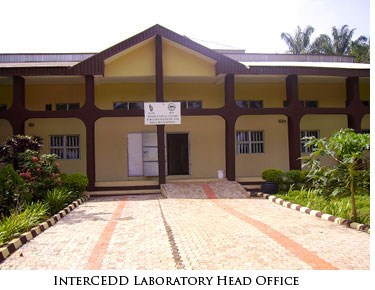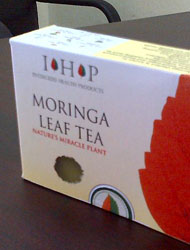|
ABOUT InterCEDD
International Centre for Ethnomedicine and Drug Development (InterCEDD) is a leading research, development, and analytic laboratory that provide product development, training, quality assurance and pilot manufacturing service to scientists, traditional medicine practitioners, institutions and pharmaceutical, personal care products, cosmetic and dietary supplements industries. The centre provides support services to companies, institutions and organizations that are involved in the development and manufacturing of high quality herbal products; and to researchers (chemists, pharmacologists, medical scientists, microbiologists, immunologists, biochemists etc.) who are interested in natural products validation, analysis and development.
 InterCEDD has a long history of collaborative investigations in drug discovery programs. The Center provides a link between ethnomedicine as it exists in the Traditional African Medicine (TAM) and modern evidence based medicine with a well established consortium of research laboratories and universities in Africa and across the world notably among them are Universities of Jos, Buea, Utah, Mississippi, Pittsburgh. InterCEDD has a long history of collaborative investigations in drug discovery programs. The Center provides a link between ethnomedicine as it exists in the Traditional African Medicine (TAM) and modern evidence based medicine with a well established consortium of research laboratories and universities in Africa and across the world notably among them are Universities of Jos, Buea, Utah, Mississippi, Pittsburgh.
InterCEDD was originally established to conduct ethnomedical research on antimalarial agents but has been greatly enhanced to become a regional reference laboratory for investigators working on the development and standardization of herbal medicines as therapeutic agents. The capability of the centre has also been extended to include an in vitro anti-HIV screening unit with equipment for cell line growth and storage, pharmacokinetics laboratory, pilot scale extraction unit and facilities for quality control of finished products. |

Moringa Leaf Tea - contains all the richness of the Moringa plant. It is a good immune booster, anti-oxidant and detoxifier. Packaged for tea brewing purposes. |
| |
OUR GOAL
The overall goal of the programme is to facilitate the development and production of herbal medicinal products through the establishment of the requisite capability and capacity in the region that would strengthen the ability of African scientists, institutions and traditional healers to work in a collaborative manner to enhance the use of traditional medicines and to transform some of them into modern therapeutic agents.
BRIEF HISTORY OF InterCEDD
InterCEDD was founded in 1993 to fill and provide a link between ethnomedicine as it exists in the Traditional African Medicine (TAM) and modern evidence based medicine. Situated at Aku road in the historic university town of Nsukka in Southern Nigeria, it consists of 3000 square feet of a functioning microbiology laboratory with modern facilities. The phytochemistry/ Pharmacognosy laboratory is well-equipped for chemical and biological research and development work and an automatic standby generator for uninterrupted power supply. A wide range of modern equipment/instruments for phytochemical research, pharmacognostical analyses of herbal drug formulations, microbiological and clinical outcome studies are available in the centre. Instrumentation is in place for high throughput evaluation of compounds using an array of functioning screening assays including antiHIV, antimalarial, antibacterial and antifungal screens. Furthermore, the Centre has active protocols and facilities for plant identification, estimation and analyses of active medicinal principles. From the modest beginning in 1993 InterCEDD has grown to be a leader in ethnomedicine and drug development.
Our Basic Approach for validation of Ethnomedicine consists of the following step:
* Conducting ethnomedicinecal surveys of plant used for indigenous treatment of diseases that have clearly identified symptoms or symptom-complexes
* Subjecting the list to biological and chemical de-replication and selecting only those plants that are used across large communities, areas or among different ethnic groups
* Excluding plants that belong to groups already designated undesirable by several criteria;
* Including plants that are still in current use as traditional remedies which are then evaluated using Clinical 0utcome-Based Evaluated [COBE] process.
* The few plants that are positive in the COBE study are then selected for in-depth laboratory studies.
* Our method has led to the identification of several plants as potential therapeutic agents
|
|
